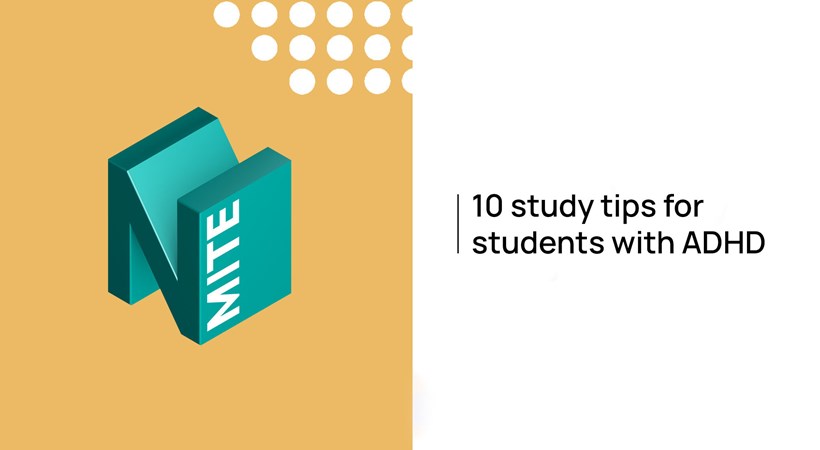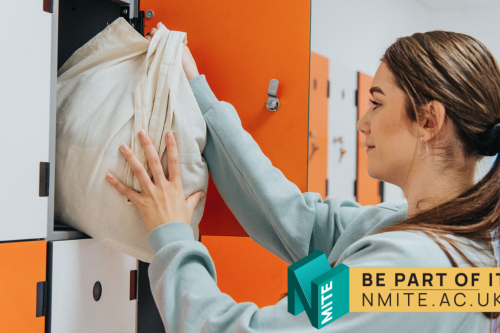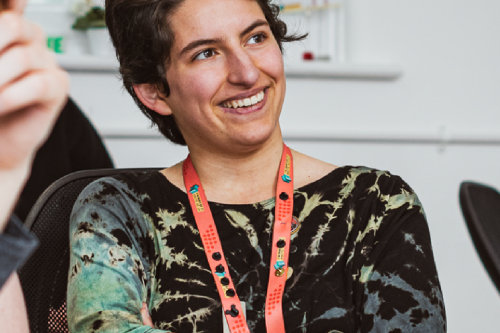We've pulled together some top tips for students who wish to enter, or who have already entered, higher education. And they’re worth reading!
Attention Deficit Hyperactivity Disorder (ADHD) is a disorder of brain development that can involve difficulty in directing concentration, hyperactivity and impulsiveness. Emotions can be difficult to manage, and it can be hard to do the things you need to do to achieve your goals. ADHD usually presents itself from childhood - of all the children with ADHD, about half will continue to have symptoms as adults, and 1 in 7 will continue to have full ADHD as an adult.
It’s not all considered bad news though. Celebrities with ADHD who share their stories help to reduce some of the stigma. Emerging research is demonstrating some of the significant strengths of people with ADHD, including out-of-the-box thinking, creativity, courage, very high energy levels, ability to easily start social conversations with new people, and having lots of resilience.
Some of the characteristics of ADHD really make life as a student challenging, so here are my Top 10 Tips for Studying with ADHD. They’re ideas to try rather than rules…ADHD varies from person to person, looks different in adulthood than childhood, and appears differently in women than men.
- Work on one thing at a time (and that includes the ideas on this list)
People with ADHD can get overwhelmed easily and may find it difficult to work out a way forward when facing lots of different options. You don’t need to – and can’t – become super-productive overnight. Choose the area that is causing you the most difficulty, then try one idea to improve it. Always evaluate the idea before trying anything else.
- Stop beating yourself up
You have ADHD, you aren’t a failure and you certainly aren’t lazy. Medication can be helpful, but it’s not a magic wand, it takes a while to get right, and – depending on your medication – will wear off at different rates and at different times. When joining a new place of learning, you’ll be in a completely new environment, without the same structure as school and living at home. It is a huge transition and you’ll need to work out how to be productive. If you have a diagnosis, or suspect you have ADHD, consider accessing the Student Support Services available to you – they can support you, and that is what they’re there for.
- Make Time Visible
ADHD can make you insensitive to how much time is passing, and generally, what time it is! Minutes, hours, days and weeks can pass in the blink of an eye. Externalise time by having a wall calendar with days you can mark off, clocks with clear and readable dials, wearing a wristwatch, or using timers during study periods. These types of external prompts remind you of how much time is passing, help stop time slipping away from you, and help you evaluate your progress against your goals.
- Get a good time management system
Digital organisation systems are great, but they only work if you remember to open them and use them. If online calendars and Gantt charts aren’t working for you, make it physical. Try a large-scale printout for your wall, a whiteboard/magnetic drywipe (or even hand-drawn lining paper) or a journal (hello bullet journal method). Talk to your tutor how you can plan your work and ask your fellow students how they go about planning.
- Make yourself accountable
People with ADHD can resist routine, but it is phenomenally helpful in staying on top of things and helping you manage your time. Attending your lectures and going to optional seminars and tutorials is one of the most constructive habits you can make. In these Covid times, try to stick to your planned timetable, and participate in synchronous sessions – this will help you develop a daily routine, stay connected and help you judge how you are doing. Outside the timetable, get a study partner/study group. Find someone who will understand what your goals are and know whether you are achieving them or not. The sooner you admit out loud that you’re going off-course, the sooner you can get back on track.
- Be careful with your extra-curricular commitments
Extra-curricular activities are important for your mental and physical wellbeing and a great part of the University experience. However, ADHD can mean you’re impulsive and like starting new activities, so you might sign up for a whole bunch of clubs that make demands on your time and mean you have made more commitments than you can fulfil. So, don’t jump in too quickly, and balance activities that require a regular long-term commitment with those you can dip in and out of.
- Be open to new ideas that will support your attention
If you have ADHD and you are faced with work that you think is boring and repetitive, it is unbelievably difficult to concentrate on it. How you respond to this will be personal. Doodling, note taking and use of colour in notes helps me, as does drawing concepts maps so I understand how ideas are related to one another and can add to it as I go along. For revision, or working on assignments, try the pomodoro technique. Above all, remember why you are doing what you’re doing. You have goals, successfully completing your studies will help you achieve them.
- Ask for help if you’re finding it difficult to prioritise
If you have long reading lists and you don’t know what is essential/not essential, or your module content is not broken up into chunks that you can use for planning, do ask your module leader for help. This is a completely reasonable request, and students with other conditions (for example, Dyslexia) will be asking this too.
- Look after your physical wellbeing.
If you have prescribed medication, take it. Keep up with your medical appointments – this is a critical part of your support system. Don’t self-medicate with alcohol or other drugs.
- Let yourself shine
Because of those strengths I mentioned earlier, there will be times in your course where you will absolutely shine. It might be getting completely absorbed in your dissertation topic, generating solution ideas for a problem you’re working on, or connecting different ideas together in ways that other people don’t. Allow yourself to enjoy these – not everything is a struggle, and you should be learning a lot about your strengths at University too. Reflecting on your successes and strengths gives some important balance to the frustrations and worry you’ll feel, but it’s also helpful in learning about yourself so you can make more informed future career directions.
Sources
Carnes, B. I. L. L., & Holloway, M. (2009). Attention deficit hyperactivity disorder (ADHD) in the workplace. Graziadio Business Report, 12(2), 1-6. Available open access here.
Kwon, S. J., Kim, Y., & Kwak, Y. (2018). Difficulties faced by university students with self-reported symptoms of attention-deficit hyperactivity disorder: a qualitative study. Child and adolescent psychiatry and mental health, 12(1), 1-8. Available open access here.
Reaser, A., Prevatt, F., Petscher, Y., & Proctor, B. (2007). The learning and study strategies of college students with ADHD. Psychology in the Schools, 44(6), 627-638. Available open access here.
Royal College of Psychiatrists. ADHD in Adults. May 2020.
Sedgwick, J. A., Merwood, A., & Asherson, P. (2019). The positive aspects of attention deficit hyperactivity disorder: a qualitative investigation of successful adults with ADHD. ADHD Attention Deficit and Hyperactivity Disorders, 11(3), 241-253. Available open access here.







